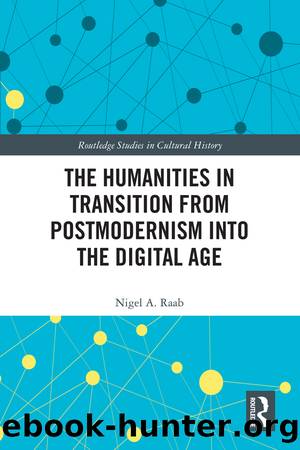The Humanities in Transition From Postmodernism Into the Digital Age by Nigel A Raab

Author:Nigel A Raab [Raab, Nigel A]
Language: eng
Format: epub
ISBN: 9781000091465
Goodreads: 51993037
Publisher: Routledge
Published: 2020-05-31T00:00:00+00:00
Notes
1 Martin Erwig, Once Upon an Algorithm: How Stories Explain Computing (Cambridge, MA: The MIT Press, 2017), 17. In the context of the current discussion, this book is fascinating because the author has made an extreme effort to employ postmodern terminology yet advocates a method completely at odds with postmodernism. As presented, the two approaches are impossible to reconcile.
2 Ed Finn, What Algorithms Want: Imagination in the Age of Computing (Cambridge, MA: MIT Press, 2017), 19. A variant of this theme appears in Arlindo L. Oliveira, The Digital Mind: How Science Is Redefining Humanity (Cambridge, MA: The MIT Press, 2017). Oliveira asks, what is the set of roads with [the] shortest total length that will keep all the cities connected?
3 See the opening page of Martin Heidegger, Holzwege (Frankfurt am Main: V. Klostermann, 1950). The title has been translated as âOff the Beaten Trackâ but this is rather misleading. The German original has wood/forest in the title; the material substance is critical to Heideggerâs meaning and materiality resurfaces throughout the volume. The translation also suggests what the Holzwege were not rather than what they were. True, they were not the main roads; but they were paths, and they were beaten by the soft soles of individuals who really knew their forest environment. See Martin Heidegger, Off the Beaten Track, ed. Julian Young and Kenneth Haynes (Cambridge and New York: Cambridge University Press, 2002).
4 Finn, What Algorithms Want, 5.
5 This reference appears in Finn but relies on the work of Wendy Chun. See Wendy Hui Kyong Chun, Programmed Visions: Software and Memory (Cambridge, MA: MIT Press, 2011).
6 See the title heading to chapter one in Katherine Hayles, My Mother Was a Computer: Digital Subjects and Literary Texts (Chicago: University of Chicago Press, 2005).
7 Pedro Domingos, The Master Algorithm: How the Quest for the Ultimate Learning Machine Will Remake Our World (New York, NY: Basic Books, 2015), 47.
8 Noble, Algorithms of Oppression, 10.
9 Tarleton Gillespie, âThe Relevance of Algorithms,â in Media Technologies: Essays on Communication, Materiality, and Society, ed. Tarleton Gillespie, Pablo J. Boczkowski, and Kirsten A. Foot (Cambridge, MA: The MIT Press, 2014), 169.
10 Gillespie, âThe Relevance of Algorithms,â 179.
11 James Grimmelmann, âThe Google Dilemma,â New York Law School Law Review 53 (September 2008): 944.
12 Pasquale, The Black Box Society, 3.
13 Erwig, Once Upon an Algorithm, 162.
14 Erwig, Once Upon an Algorithm, 162.
15 Erwig, Once Upon an Algorithm, 145.
16 Erwig, Once Upon an Algorithm, 75.
17 Erwig, Once Upon an Algorithm, 92.
18 Erwig, Once Upon an Algorithm, 182.
19 Erwig, Once Upon an Algorithm, 51, 145, 181, emphasis in original.
20 Erwig, Once Upon an Algorithm, 54.
21 Quine, Word and Object, 27.
22 For a more philosophical perspective, see John R. Searle, âMinds, Brains, and Programs,â Behavioral and Brain Sciences 3, no. 3 (1980): 417â57.
23 Ludwig Wittgenstein, Philosophical Investigations, ed. G. E. M. Anscombe, 3rd ed. (Oxford and Malden, MA: Blackwell, 2001), 87. Der Wegweiser ist in Ordnungâwenn er, unter normalen Verhältnissen, seinen Zweck erfüllt.
24 Rudolf Carnap, The Logical Structure of the World, trans. Rolf A.
Download
This site does not store any files on its server. We only index and link to content provided by other sites. Please contact the content providers to delete copyright contents if any and email us, we'll remove relevant links or contents immediately.
The World Almanac and Book of Facts 2021 by Sarah Janssen(878)
The emperor wears no clothes by Jack Herer(383)
The Way Home by Unknown(351)
The Crises of Civilization by Dipesh Chakrabarty(326)
History of India: A History In 50 Events by Hourly History(290)
Darius in the Shadow of Alexander by Pierre Briant(284)
Hidden Links by Zac Sangeeth & Sangeeth Varghese(270)
A Military History of the Cold War, 1962â1991 by Jonathan M. House(265)
The History of Human Marriage by Edward Westermarck(264)
Prehistoric Europe by Champion Timothy. Whittle Alasdair. Shennan Stephen. Gamble Clive(255)
Flood Legends: Global Clues of a Common Event by Charles Martin(251)
History of the Jews: An Enthralling Guide from Ancient Times to the Present (Religion in Past Times) by Wellman Billy(239)
Chinese History: 500 Interesting Facts About China (Curious Histories Collection) by Ahoy Publications(226)
Big Tent by Mallory Factor(214)
The Education of Historians for Twenty-First Century by Thomas Bender; Philip F. Katz; Colin A. Palmer(212)
Mark Of The Scots - Cl by Duncan A. Bruce(203)
The Philosophy of Historiography by John Lange(202)
Other Pasts, Different Presents, Alternative Futures by Jeremy Black(201)
Ancient Roman Sports, A-Z : Athletes, Venues, Events and Terms by David Matz(195)
